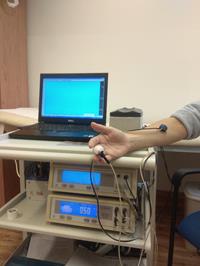Introducing the scientific group of Professor Jan Škrha
This team works at the Third Medical Department and Laboratory for Endocrinology and Metabolism of the First Faculty of Medicine of the Charles University and the General University Hospital. It is headed by Professor Jan Škrha and includes doc. Martin Prázný, MUDr. Milan Flekač, MUDr. Jan Šoupal, MUDr. Jan Škrha Jr., MUDr. Eva Horová, and MUDr. Tomáš Pelcl, but also diabetology nurses, education and nutrition advisors, a psychologist, and laboratory staff.
Focus
The main focus of
research undertaken by this group is diabetes mellitus and regulation of
glucose metabolism. In long term, the team addresses the issue of pathogenesis
of blood supply complications with emphasis of oxidation stress and its role in
the development of damage to blood vessel walls. Alongside determination of biochemical
indicators, genetic studies on select enzymes, and analysis of glycaemic
variability using glucose sensor, the team also uses unique instrumental
methods – such as the Doppler laser – to study microcirculation, and skin
autofluorescence to evaluate advanced glycation.
The second group of subjects investigated by the team takes the form of clinical research of various therapeutic regimens of diabetes, from lifestyle changes to pharmacotherapy and all the way to various ways of monitoring glucose levels. The third and unique focus of the team’s research is the study of spontaneous hypoglycaemic states. In this area, the team is the main reference point in the Czech Republic with respect to diagnosing organic hyperinsulinism. The team has at its disposal the largest database of patients with this diagnosis in Europe. And finally, the fourth range of subjects the team deals with is the study of relations between diabetes and pancreatic cancer with focus on early diagnosis. The team’s research is closely connected with clinical practice.
Collaboration, grants, projects
In terms of laboratory studies, the team collaborates with the Institute of Medical Biochemistry and Laboratory Diagnostics and with the BIOCEV Centre. We also have successful clinical collaboration on operative treatment of insulinomas with the First Department of Surgery, while the toxic effects of dioxins via oxidative stress has been investigated in collaboration with the Department of Occupational Medicine. International collaboration with the Swedish Karolinska Institutet led to international stays of three of our doctoral students and resulted in publications focused on selected genetic polymorphisms and biomarkers linked to changes in blood vessels. Currently, we are starting to develop collaboration with the University of Milano as part of our research project on the regulation of apoptosis of pancreatic B-cells, which uses our samples of insulinomas. Collaboration with Professor Grunberger’s institute in Michigan focuses on clinical diabetology.
Our team used to participate in IGA grants, but at the moment we work on a grant project by the Agency for Medical Research of the Czech Republic, which deals with the study of glycaemic variability in relation to microangiopathic complications of diabetes. For the past two decades, our team has been participating in a number of institutional projects of the Ministry of Education of the Czech Republic and the Charles University. Recently, we have been involved in Progres Q25 and the RVO project. The head of our team is active in two committees of specialist groups of the European Association for the Study of Diabetes (EASD) and in the board of the Central European Diabetes Association (CEDA).
Important results
 Our group follows
up on a long tradition of diabetes research at the Third Medical Department and
in recent years, the work of our recent doctoral students is coming to the
fore. Publications by team members have been published by a wide range of
international journals on diabetology, including Diabetic Medicine,
Diabetologia, Diabetes Care, Diabetes Research and
Clinical Practice, Experimental and Clinical
Endocrinology and Metabolism, BMC Genetics,
and others. Invited lectures at international congresses also reflect the
professional status of our team members. Last year, the team’s greatest success
was publication in the prestigious diabetology journal Diabetes Care
with important implications for clinical practice, which shows that in patients
with Type 1 diabetes, the manner of monitoring glycaemia is more important than
the form of insulin delivery.
Our group follows
up on a long tradition of diabetes research at the Third Medical Department and
in recent years, the work of our recent doctoral students is coming to the
fore. Publications by team members have been published by a wide range of
international journals on diabetology, including Diabetic Medicine,
Diabetologia, Diabetes Care, Diabetes Research and
Clinical Practice, Experimental and Clinical
Endocrinology and Metabolism, BMC Genetics,
and others. Invited lectures at international congresses also reflect the
professional status of our team members. Last year, the team’s greatest success
was publication in the prestigious diabetology journal Diabetes Care
with important implications for clinical practice, which shows that in patients
with Type 1 diabetes, the manner of monitoring glycaemia is more important than
the form of insulin delivery.
For further information, contact us at jan.skrha@lf1.cuni.cz.
